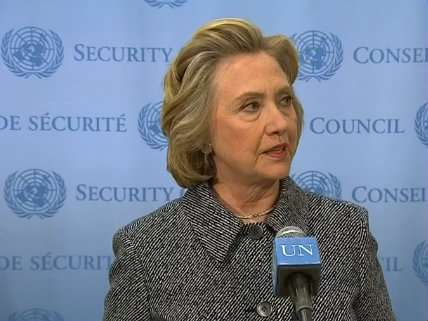Hillary Clinton Does Not Like Transparency
The Clintons have repeatedly sought to avoid or undermine disclosure requests and requirements.
If there is a single, unifying theme to draw from the spate of negative stories that have dogged Hillary Clinton's presidential campaign so far, it is that the Clintons do not care for transparency.
That's the main thing we learned from the story that Hillary Clinton, while serving as

Secretary of State, relied exclusively on a privately run nongovernmental email address to conduct her business. Clinton has since turned over thousands of emails to the Department of State for record keeping, but her aides chose which emails would be made available and which would be kept private. The email system, run out of Clinton's home, was designed in a way that made sure that only Clinton and her trusted lieutenants could access any emails she sent or recieved. Indeed, the server holding the emails was apparently wiped clean, preventing any further disclosure.
The follow-up to the email story, in which Clinton attempted to explain her reliance on the personal email account, only furthers the impression that she dislikes disclosure. Hillary Clinton provided a spate of excuses for why she kept her email private, but none of them were entirely convincing. She said she wanted to carry one device, but had previously admitted to carrying two. She said emails were sent to other government accounts that were auto-archived, but which weren't. She said she wouldn't allow server access in part to protect communications from her husband, President Bill Clinton, but Clinton reportedly doesn't use email. The parade of weak excuses gave, at the very least, a strong sense that Clinton did not want to be clear with the public.
That the Clintons do not like transparency requirements is also the biggest takeaway from the spate of stories about the intersections between the Clinton Foundation and its donors and Hillary Clinton's work as Secretary of State.
More than $2 million in donations made from the family foundation of the founder of Uranium One—donations which coincided with State Department approval of a Russian takeover of the company—were "not publicly disclosed by the Clintons, despite an agreement Mrs. Clinton had struck with the Obama White House to publicly identify all donors," according to The New York Times.
In other words, Clinton, while serving as Secretary State, made an agreement with the White House to disclose Clinton Foundation donors—a transparency agreement—but did not follow through on the terms of that agreement.
Nor is this the only disclosure failure related to the story. The source of those donations was a Canadian partner of the Clinton foundation dubbed the "Clinton Giustra Enterprise Partnership," (CGEP) and it too was covered by the disclosure requirements in Clinton's agreement with the Obama administration. Yet according to a Bloomberg report yesterday, there are 1,100 undisclosed donors to that foundation. CGEP told Bloomberg that the organization was forbidden by Canadian tax law to make the names of its donors public, but "Canadian tax and privacy law experts were dubious of this claim," with a former tax official telling Bloomberg, "There's nothing that would preclude them from releasing the names of donors." The Washington Post's Fact Checker looked into the claim that Canadian law prevented donor disclosure and found the statement dubious, giving it three Pinocchios.
In other cases, the Clinton Foundation (the main organization here in the U.S.) has complied with some transparency requirements. But not well. A Reuters investigation found that the Clinton Foundation's nonprofit disclosure documents were filled with errors, which the Foundation now says it will correct through refilling. Once again, transparency is at stake.
The unsettled numbers on the tax returns are not evidence of wrongdoing but tend to undermine the 990s role as a form of public accountability, experts in charity law and transparency advocates told Reuters.
"If those numbers keep changing - well, actually, we spent this on this, not that on that - it really defeats the purpose," said Bill Allison, a senior fellow at the Sunlight Foundation, a government transparency advocacy group. [bold added]
The Clinton family can't even get its own record on transparency right. Chelsea Clinton, who is now included in the Clinton Foundation's full name, recently claimed, in defense of the organization, that "Transparency International and others have said we're among the most transparent foundations." But as NPR points out, while Transparency International did give Hillary Clinton a 2012 Integrity Award for her work as Secretary of State, it never gave any award to the Clinton Foundation. As NRO's Jim Geraghty says, it's more than just an error; it's a telling mistake, because it confuses Hillary Clinton's work at the State Department with the Clinton Foundation's non-governmental activities. The muddled distinction between the two is exactly the issue.
None of the evidence so far has established a direct influence between Clinton Foundation activities and Hillary Clinton's work at the State Department, but the suggestion of impropriety is strong, and the consistent resistance to transparency makes it stronger still. We don't know everything that happened, in other words, but it's clear that whatever occurred, the Clintons have no interest in telling us about it.


Show Comments (127)